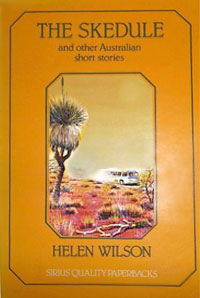|

|
|
Last Bus to Banjo Creek
Rod Taylor spent more than a decade trying to produce this film, which
he described as "a sort of 'African Queen' on a truck." But with
the feeling that he was "flogging a dead horse" and hope that
other opportunities were opening up in Australia, Taylor finally abandoned
the project.
The film had its origin in a short story titled "The Skedule,"
first published in 1956 by Australian author Helen Wilson. Prolific
British playwright and screenwriter Ted Willis adapted the
screenplay in the early 1960s, and the film rights were first bought
by J. Arthur Rank and then Universal. Several news reports had Rod
set to star in the picture, but it never came to pass.
Taylor explained further, from the set of "The
Picture Show Man," in Australia:
I had a script called "Banjo Creek," written
by Ted Willis, that had been re-written by some hack at Universal Studios
for a production to be made in Australia. I thought the Universal version
was a piece of shit, so I added some dialogue and made it good and Aussie
and, I thought, funny. But unfortunately I got static from Willis about
changing his script -- me, not Universal!
-- Cinema Papers (Australia), January 1977
The story involved a pretty, fragile English girl who has to get to the
Outback and is taken there by "a sweaty oaf in a truck." Of course, the pair encounter many disasters, including breaking down in the desert.
And of course, they fall in love along the way.
Candidates to play leading lady to Rod's "sweaty oaf" included Maggie
Smith, Julie Andrews, Sarah Miles, Olivia Newton-John or Glenda Jackson.
A June 14, 1970, article in the Sydney Morning Herald had Taylor going to
Australia in September of that year to make two films -- an American Western
called "Slocum" and "Last Bus to Banjo Creek.
'I hope Maggie Smith will co-star,' Rod said. 'I have talked with her on the telephone in
London and told her all about it and sent her a script. I hope to hear soon that
she will agree to do it. If so, her husband, Robert Stephens, will probably
direct.'
The first script was written by Lord Ted Willis (1918-1992), a pioneering
and prolific English screenwriter.
Willis created 41 TV serials, wrote 37
stage plays, a dozen novels and scripts for 39 feature films. Among his
notable creations was "Dixon Of Dock Green," the longest-running
police series on British television (1955-76).
Beginning in 1965, Willis went to Los Angeles to develop the screenplay
for Universal along with a script editor who informed Willis that "our
first job would be to cut 30 pages from the screenplay."
After little progress, Willis went home on the understanding that he
would return when the film started pre-production. However, Universal experienced
several internal shakeups, and Willis remarked:
I felt in my bones that this was yet another screenplay
that would not go before the cameras. In the next 10 years, a half-dozen
producers read it and became keen but the project seem to be jinxed, for
something always intervened to stop further progress.
Rod Taylor was still optimistic about the film in a 1975 interview:
I've been meaning to get out here to make it for the past
11 years. Every time I think I'll make it, another film comes up or finance
for it dries up, but this time next year, I reckon I'll be back to do it.
... There's more money around here now for film-making.
-- TV Week (Australia), Nov. 1, 1975
In "Rod Taylor: An Aussie in Hollywood,"
author Stephen Vagg notes that Rod's version of the script would
have made "quite an entertaining film." Vagg has read a copy
of the script from the mid-1970s and reports that "much of it is
unexpectedly wonderful," with warm vignettes, romanticism and
emotion.
Vagg particularly notes the bond that forms between the two lead
characters, Helen and Jim. "Helen is a strong character, sexy,
classy and sympathetic," Vagg writes. "One cannot help but think Rod
was channeling Maggie Smith when he was writing."
|
|

|
LINKS |
|
Not Starring Rod Taylor: Take a look at more
projects that Taylor considered, but that never came to be.
Ted Willis obituary
Helen Wilson information
TV Week, 1965: Rod
Taylor coming home to take the last bus to Banjo Creek
Canberra Times, 1968:
Author of 'The Skedule' waits for the film
Australia Women's
Weekly, 1968: Lord Ted wants Julie for an Outback film
Sydney Morning Herald,
1970: Rod Taylor to make two films in Australia
TV Times, 1975:
Snippet about Last Bus to Banjo Creek |
|
|
|
ROD AS WRITER
|
|
Rod Taylor said he has done a lot of re-writing, but he's
written only one film from scratch, "The Treasure
Seekers."
Among the films Rod's done some re-writing for:
"Chuka": At the peak
of his acting career, Taylor also was immersed in producing this Western,
spending evenings and weekends writing and rewriting the script based on
a novel by Richard Jessup.
"The Deadly Trackers":
Taylor contributed new scenes to invigorate the hatred between hero and
villain: "I think that's what the story lacked -- a decent account
of the villain's villainy," he said.
"Young Cassidy":
Taylor offered contributions as he tried to follow John Ford's orders to
bring Julie Christie's character back into the picture toward the end. "I
wrote a scene where she's in a doorway after hooking too much, shabby and
dirty, and they didn't go for it," Taylor explained.
|
|